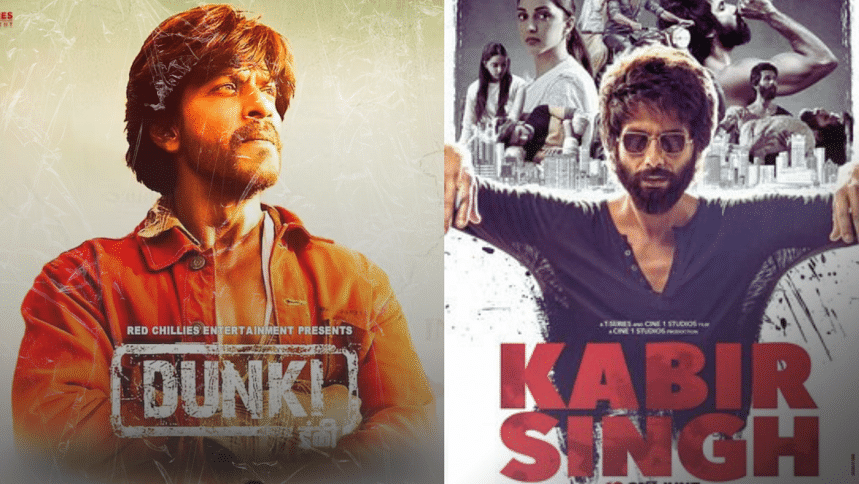In a world that glorifies Kabir Singh, choose Hardy Singh

Bollywood produced its first ever movie in the 1930s. Since then, more than 10,000 films have come out of the industry, and countless actors have enjoyed stardom — and superstardom — thanks to it. Almost a century later, however, perhaps it is time for viewers to ask, at what cost has this success come to be?
Back when women's rights were not as widely recognised in society, actors such as Amitabh Bachchan built entire careers out of toxic masculinity (read: The Angry Young Man persona). Bollywood's scriptwriters wrote hero-centric movies that rarely gave heroines much by way of character development. Women either existed as obedient wives, submissive lovers, or chaste mothers.
Over the course of time, Bollywood, just like any other industry, tried to redeem itself as best it could, realigning its content with the changing sentiments and values of the viewers. Actors became more aware of choosing films that put forth the right message to their audiences. Movies that normalised taking therapy, such as Dear Zindagi, or those that portrayed strong and spirited women, such as Queen, were appreciated by viewers. As Bollywood movies went global, some producers did their best to echo progressive narratives on women's rights and feminism.
If, at any time, the success of these liberal movies starts to feel like an upward growth trajectory for Bollywood's content writers, we advise you to snap back to reality, for Bollywood has never been known for predictability. Swinging like a rogue pendulum, it has churned out a mixed platter of content over the years, and seen some surprising hits and misses.
Take for instance, the resounding success of movies like Kabir Singh, or more recently, Animal. One would think that almost a century in business would have taught Bollywood to write a decent love story without making it threatening for women. Or that such anti-feminist, triggering content, in this day and age, would be shot down by viewers on day one. Unfortunately, however, much of India remains steeped in patriarchy and producers too, as tone-deaf as it seems, have decided to go with what the majority wants to watch, rather than teaching the majority what to watch.
The result? Both movies chose to glorify violence and misogyny in the name of love and artistic freedom. Both movies had alpha male characters with anger issues, and meek female counterparts doing their bidding and bending over backwards to prove their devotion to them. Both movies went on to become blockbuster hits in the years of their release.
Bolstered by the power of his pen, prominent writer Javed Akhter has voiced our deepest fears quite boldly, foreseeing the cyclical danger of such content on viewers, young and old. Art, after all, has the power to shape psyches, and one tends to normalise more of what one sees. The veteran writer, just like the rest of us, is scared about the how the moviemakers have chosen to use the power of their art.
Thankfully, however, a pendulum swings both ways. Quietly trying to tip the scales the other way, are producers that are writing characters such as Dunki's Hardy Singh. For every Kabir and Ranvijay that make women seem unimportant and small, is a Hardy that crosses oceans and deserts for his love interest.
For those that feel that Hardy sets an unrealistic standard by waiting for his love interest for twenty-five years, fans would agree that this is by far, a better form of extremism than that which is set by violent movies. In a world that increasingly relies on instant gratification, such respectful patience is not just a virtue, it is a prerequisite course in true love.
Refreshing to see also, is how the character of Hardy never once tries to own his lover, choosing instead to call himself, her man — doing what he can for her, and stepping back to respect her decision when she chooses to stay back. There are no blame games here, no guilt tripping, no pressing calls to come back home and no hard feelings, as he rushes to help her, years after she stops contact. He puts the love of his life on a pedestal, and silently shows the Kabirs and Ranvijays of the world how it's done.
India is home to 1.8 billion people. According to statistics, more than 50 per cent of its population lies below the age of 25 and more than 65 per cent, below the age of 35, making it a country with one of the largest numbers of millennial and Gen Z populations globally. The producers seem set in their money-making ways so the onus is now on the viewers — do we really want the most impressionable age group from amongst us to grow up with characters that thrive on misogyny?
As one fan intelligently said, "For things to change in 'reel' life, things must change in real life." Bollywood caters to a voracious viewership, and the genius business model has actually made the ticket into a kind of vote — what you buy, is essentially what you get to see more of. Instead of expecting a cash cow business to spring morals, it is up to us, as viewers, to consciously pay for movies that are gentler and depict wholesome values to shift the narrative back in the right direction. For every Kabir Singh they write, let there be a Kabir Khan that we boost. For every Ranvijay they conjure, let there be a Hardy we revere.

 For all latest news, follow The Daily Star's Google News channel.
For all latest news, follow The Daily Star's Google News channel. 








Comments